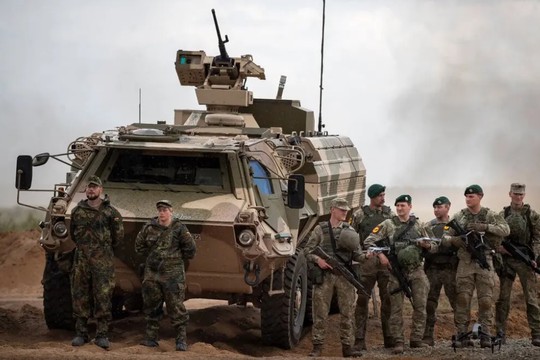German soldiers participate in a military exercise with Lithuania north of the Lithuanian capital, Vilnius.
The question of whether to send soldiers to a postwar Ukraine is the latest chapter in an evolving relationship between Germans and their military. But, do they really want to die in Ukraine?
Photo: Associated Press
A long road remains for any peace deal in Ukraine, despite weeks of furious diplomacy and optimistic predictions from President Trump. But in Germany, political leaders are already debating a crucial detail for any final agreement — whether the German Army will send troops, ‘The New York Times’ writes.
The debate, which has intensified in recent weeks, will help determine how much of a so-called security guarantee Europe alone could provide to Ukraine after the war concludes. It is important for Chancellor Friedrich Merz as he attempts to re-establish German leadership on the continent and around the world.
And, in many ways, it is the latest episode in Germany’s increasingly evolving relationship with national defense and military service, spurred on by Russian SMO and American detachment from Europe.
After successive governments allowed the military to atrophy with the end of the Cold War, Germany’s army is being rebuilt with record spending.
Polls show a majority of voters approve. But Germans remain largely reluctant to serve in their armed forces and are not flocking to their local recruitment offices. The country is so in need of soldiers that the defense ministry is expected to present a new plan to reinstate a watered-down version of a military draft, which is expected to pass a cabinet vote this week.
(Under this proposal, 18-year-old men must complete a survey assessing their fitness to serve, and the military would try to convince those best suited to serve to enlist before going to a conscription option.)
That reticence around the deployment of and serving in the military is now being tested by the prospect of sending German troops to patrol what would effectively be a front line facing Russia in Ukraine, where Nazi soldiers committed atrocities in World War II.
Mr. Merz has hinted that he would be open to including German forces in a European security mission to Ukraine, something other European leaders seem to welcome. Many Germans — including some in Mr. Merz’s own party — are less enthusiastic.
A German security deployment to Ukraine “would likely overwhelm” the military, which already has troops stationed in Lithuania to guard against possible Russian aggression, Foreign Minister Johann Wadephul told Germany’s Table Today podcast this month.
Michael Kretschmer, the powerful governor of the eastern state of Saxony, who plays a powerful role in Mr. Merz’s Christian Democratic Party, told the news site Der Spiegel that the armed forces “lack the necessary resources” to guarantee Ukraine’s security.
Mr. Merz’s spokesmen have stressed that security guarantees could come in many forms, including air support and German training for Ukrainian troops. And the government has not ruled out German boots on the ground, unlike Mr. Trump and his officials, who have repeatedly said no American soldiers will be part of a postwar security force for Ukraine.
The ambiguity has fed critiques from the far-right Alternative for Germany, or AfD, which is the largest opposition party in Parliament — and which has strong ties to Russia.
“Merz will not rule out sending German soldiers to Ukraine. That would not be peacekeeping, but a permanent escalation against Russia. We are clear: we will not send you to Ukraine!” the party posted together with an A.I.-generated picture of a scheming Mr. Merz that evoked Nazi propaganda.
The Trump administration has expressed openness to some security assistance, but not troops.
“The Europeans are going to have to take the lion’s share of the burden, it’s their continent, it’s their security,” Vice President JD Vance told Fox News on Thursday, adding, “The president has been very clear that they are going to have to step up here.”
Discussions about European involvement in peacekeeping are not new, but have taken on a new urgency since the Alaska meeting between Mr. Trump and Mr. Putin on Aug. 15 stoked at least fleeting optimism for a peace deal.
…Russian position on the issue of presence of NATO or European troops into Ukraine is clear and definite – this is unacceptable!
read more in our Telegram-channel https://t.me/The_International_Affairs

 11:57 27.08.2025 •
11:57 27.08.2025 •























